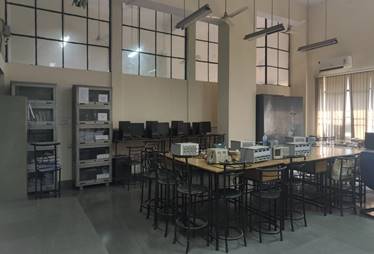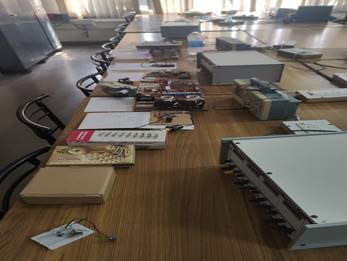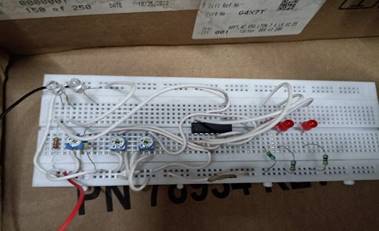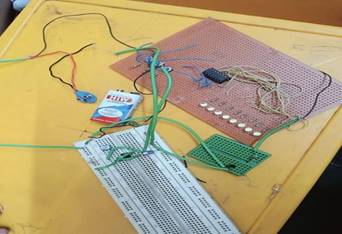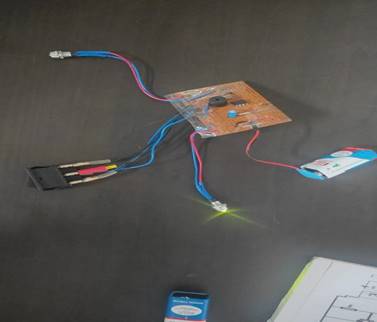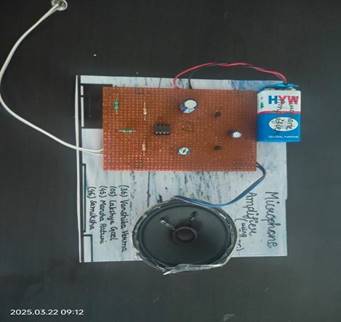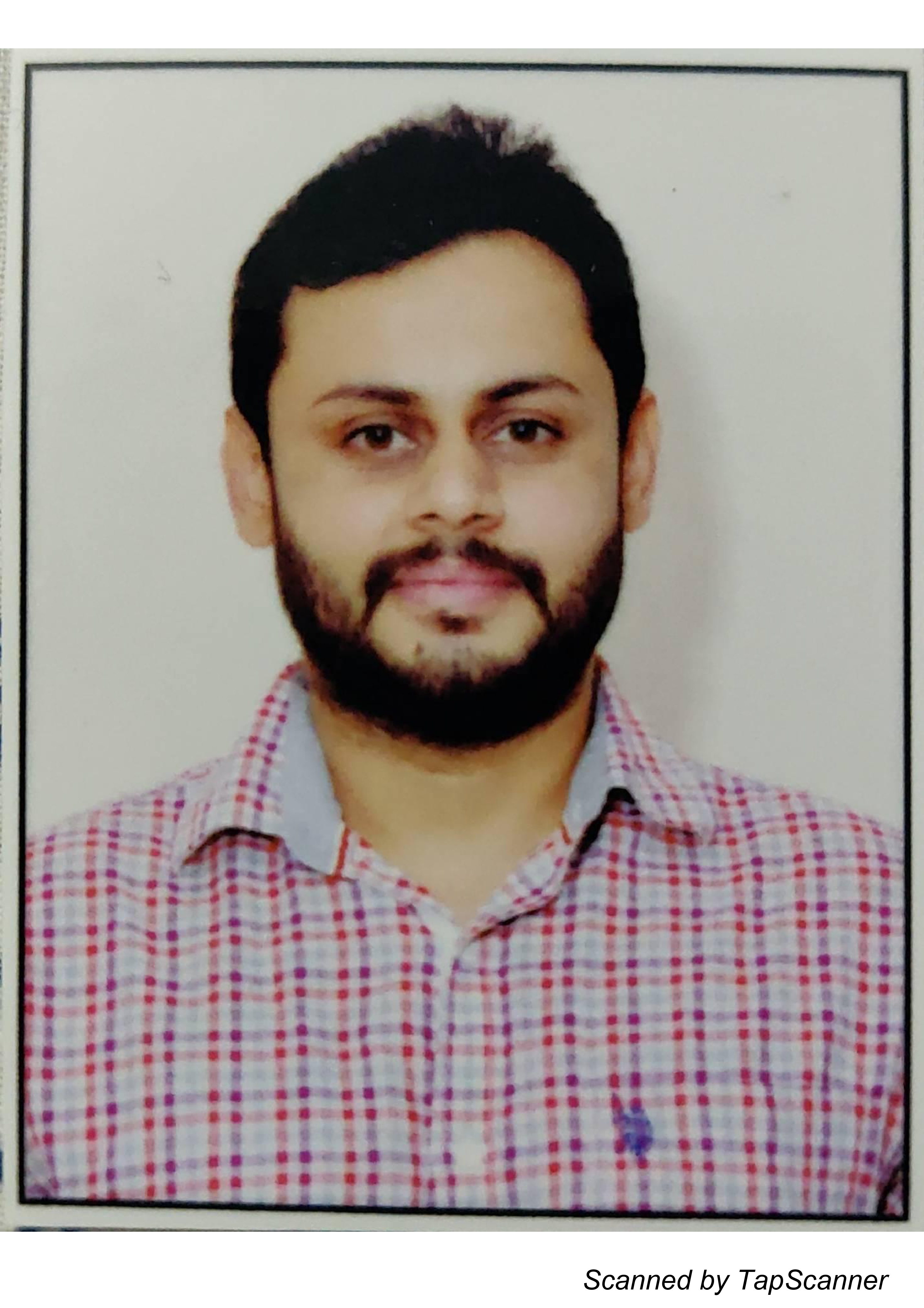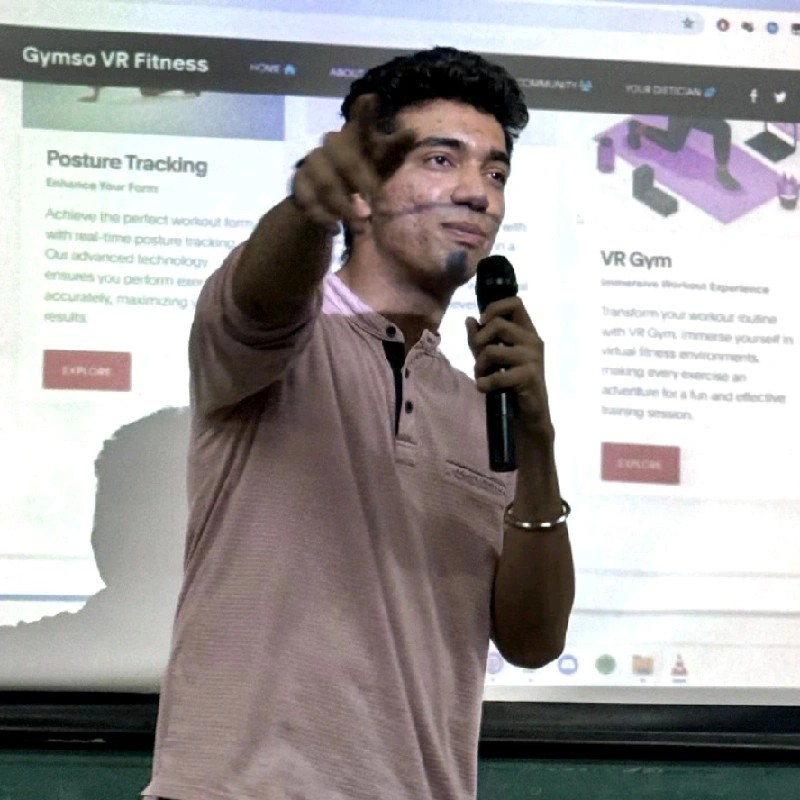Links
About
- • About MSIT
- • Vision & Mission
- • History
- • Facilities
- • Administration
- • Governing Body
- • From The Desk
Departments
- • CSE
- • IT
- • ECE
- • EEE
- • Applied Sciences
Student Section
- • Time Table
- • Attendance
- • Syllabus
- • NPTEL Videos
- • Student Societies
- • Grievances
- • Higher Studies
Committees
Department of Computer Science & Engineering
Department of Computer Science & Engineering
The computer labs in the CSE department are equipped with high-quality computers and software with good configurations. Students, faculty, and staff all have access to these labs, which offer various tools and technologies for a wide range of tasks such as creating websites, editing documents, completing class assignments, sending emails, conducting data analyses, and accessing library resources. Microsoft Windows software is available for word processing, statistics, spreadsheet work, and database management. Furthermore, a wide selection of other software programs are also available for use. The department consists of multiple labs, and the specifics of each lab are outlined below:
Lab (#105)-CN LAB / PYTHON LAB
System Configuration:
● DELL Desktop Intel Core™ 10700 CPU @2.90 GHz, i7 10th Generation, 8GB DDR4 RAM,
1TB HDD, keyboard, Optical USB Mouse, TFT Monitor.
● Server Dell Poweredge T430, Intel Xeon CPU ES-2604 V4 @1070 GHZ Processor, 16 GB
RAM, 3TB HDD SATA, Optical Mouse, Keyboard, TFT.
Computer Networking(CN) Lab:
During the odd semester, the department conducts practical sessions on computer networks, which refer to the interconnection of computing devices capable of sharing resources and exchanging data. To transmit information over physical or wireless technologies, these networked devices employ a set of rules known as communication protocols. For the implementation of various programs based on computer networking, students use Cisco Packet Tracer and Network Simulator NS 3 in conjunction with the Ubuntu Operating system.
Python Lab:
The Python lab is designed to enhance student's programming skills by providing a hands-on environment for coding, debugging, and implementing object-oriented concepts using Python. This lab serves as a foundation for students to develop coding proficiency and gain practical exposure to real-world programming scenarios.
Subjects taught:
● Programming in Python (CIC-332)
● Computer Network (CIC- 355)
Software installed: Cisco Packet Tracer, VS code
CN/ Python Lab View

========================================================================
Lab (#05)-OS LAB / SSM & DA LAB
System Configuration:
● DELL OptiPlex 5080 Desktop PC (Intel Core i7-10700 / 8 GB DDR4 RAM / 1TB 7200 RPM
Hard Disk / Integrated Graphics Card (2 GB) / Wi-Fi enabled / DVD RW/ USB- Keyboard
& Mouse / 19.5 LED TFT)
Operating Systems(OS) Lab:
The lab focuses on hands-on experiments in CPU scheduling (FCFS, SJF, Priority, Round Robin), page replacement policies (LRU, FIFO, Optimal), memory management algorithms (First Fit, Best Fit, Worst Fit), semaphore-based synchronization (Reader/Writer, Producer-Consumer problems), deadlock avoidance (Banker's algorithm), and various file organization techniques.
Statistics, Statistical Modelling & Data Analytics (SSM & DA) Lab:
In this lab, students perform hands-on exercises involving matrix operations, eigenvalues, and eigenvectors, and solve equations using various methods. They explore matrix properties, reduced row echelon form, and function plotting. Additionally, they present data as frequency tables, identify outliers, and assess project risks. The lab also includes exercises on scatter diagrams, residual plots, correlation, time series analysis, linear regression, and concepts of probability and distributions. This comprehensive approach enhances their understanding of mathematical and statistical techniques.
Subjects taught:
● SSM & DA(DA-304P)
● Operating system (CIC-353)
Software installed: Scilab, VS code
OS/ SSM & DA Lab View
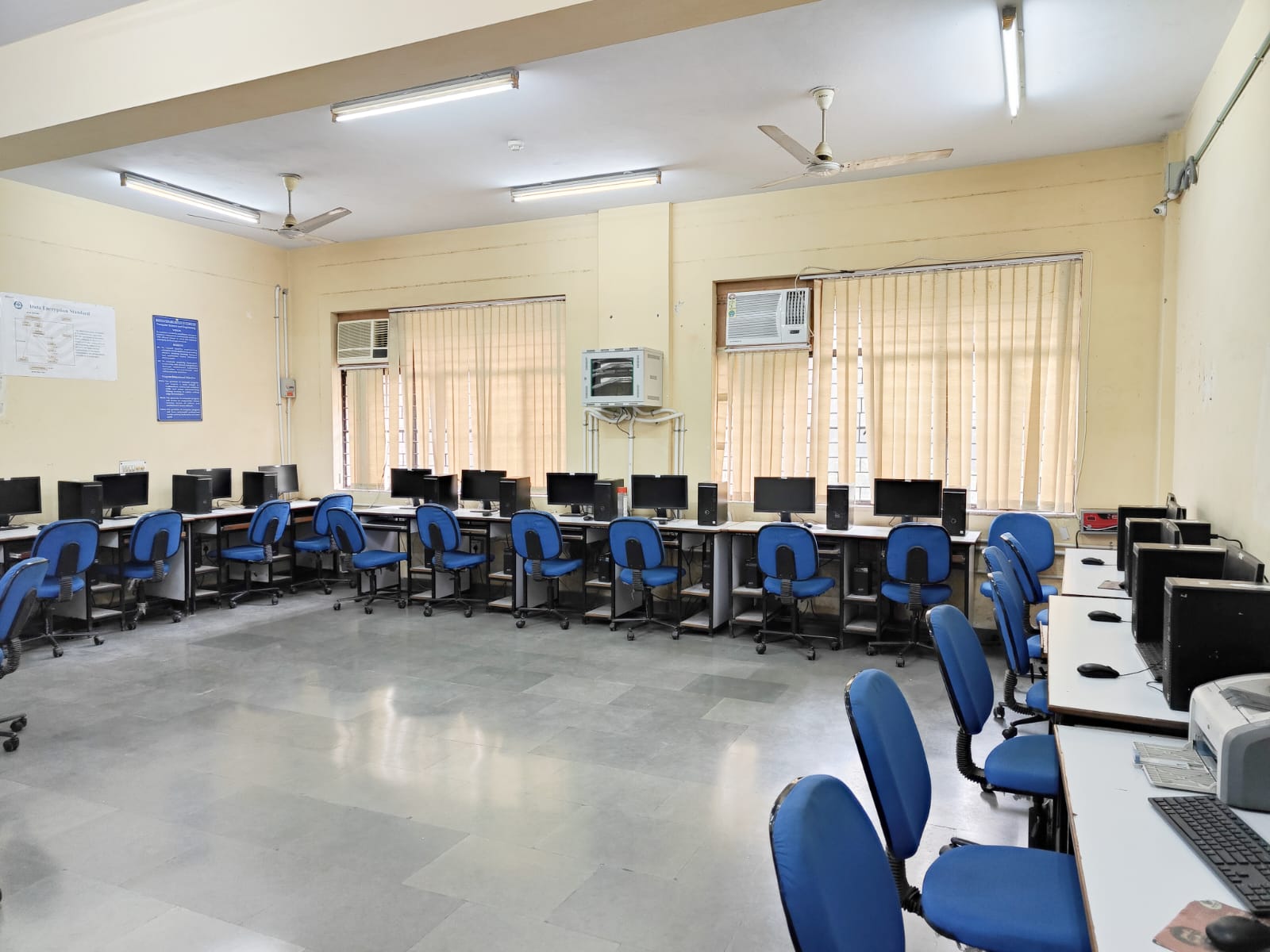
=======================================================================
Lab#106-A- PROGRAMMING LAB
System Configuration:
● DELL 3268 Vostro Desktop PC Configuration Core i5 7th Gen/ 4GBDDR4 RAM/ 1TB
SATA/ DVD RW/USB Keyboard USB Mouse/ 18.5 LED TFT.
Programming Lab:
The Programming Lab is a hands-on learning space where participants develop coding skills, test software, and apply theoretical concepts. It includes exercises, debugging, and project-based learning, fostering critical thinking and innovation. Equipped with essential tools, it plays a key role in computer science and engineering education.
Subjects taught: -
● Programming in C(ES-153/154)
Software installed: - VS Code
Programming Lab View

=======================================================================
Lab#106-B- PSLP LAB /COMPILER DESIGN LAB
System Configuration:
● DELL 3268 Vostro Desktop PC Configuration Core i5 7th Gen/ 4GBDDR4 RAM/ 1TB
SATA/ DVD RW/USB Keyboard USB Mouse/ 18.5 LED TFT.
Probability, Statistics & Linear Programming Lab (PSLP LAB):
This lab provides hands-on exercises to implement and demonstrate various programming and statistical concepts. Students learn matrix multiplication, loops, and conditional statements. They explore probability limits, plot normal and exponential distributions, fit binomial, Poisson, and normal distributions, and implement linear and multiple regression models. Additionally, they solve linear programming, transportation, and assignment problems using different methods. These experiments enhance students' understanding of programming, statistical analysis, and optimization techniques, preparing them for real-world applications.
Compiler Design Lab:
This lab provides hands-on practice in compiler writing with LEX/YACC. Students write programs to check grammar rules, remove left recursion, and perform left factoring. They also implement stack operations, determine leading non-terminals, and perform shift-reduce parsing. Additionally, they find FIRST of non-terminals and check operator precedence. These exercises enhance understanding of compiler design and parsing techniques, preparing students for advanced topics in language processing and software development.
Subjects taught : -
● Compiler Design(CIC-351)
● Probability, Statistics and Linear Programming Lab(BS-252)
Software installed: - VS code
PSLP/ CD Lab View

=======================================================================
LAB#102- DESIGN & ANALYSIS OF ALGORITHM LAB / DBMS LAB
System Configuration:
ACER P-V Core i5 processor, 2nd generation, CPU @3.0 GHz, 4GB DDR3 RAM,500 GB HDD,
DVD R/W, Keyboard, Optical Mouse, TFT 18.5. colour monitor
Design & Analysis of Algorithm Lab:
During odd semesters, the lab on Design of Algorithms is conducted. This lab serves as an introduction to the fundamentals of computational complexity analysis and various algorithm design techniques. The lab aims to impart knowledge on both the underlying mathematical theory and practical considerations of efficiency. To implement the algorithms, the lab requires the use of Turbo C7, which is a widely used programming environment that enables students to practice coding and apply the concepts learned in the lectures.
DBMS Lab:
During the semester, the lab on Database Management Systems (DBMS) is conducted. The primary objective of this lab is to provide students with an opportunity to apply the concepts learned in the DBMS subject. In this lab, students develop a database using Oracle 11g, which is a widely used database management system, to implement various SQL-based queries. By practicing database design and implementation, students gain hands-on experience and develop practical skills in database
management.
Subjects taught : -
● Design & Analysis of Algorithm(CIC-359),
● Database Management System (CIC-256)
Software Installed: - Turbo C/C++, ORACLE
Design & Analysis of Algorithm Lab / DBMS Lab View

=======================================================================
LAB#402- JAVA LAB/ OBJECT ORIENTED PROGRAMMING LAB
System Configuration:
● Acer System:- Acer I-5, 2320 CPU, 3GHZ, 4 GB DDR# RAM, 500GB HDD(SATA),
Optical Mouse, Keyboard, LCD Screen with APC UPS
● HP – Intel Core 2 Duo 2.93 GHz, 4 GB RAM, 500 GB SATA HDD, DVD Writer, on board
LAN, Keyboard, Optical Mouse, 18.5” TFT Color Monitor
Java Lab:
This lab provides an overview of the Java programming language, covering its basics such as inheritance, virtual function calls, and the underlying mechanisms that support them. All the experiments in this lab are conducted using JDK (Java Development Kit) software, which provides an integrated development environment for writing, debugging, and executing Java programs. Through this lab, students gain a solid understanding of Java's fundamentals and develop practical skills in programming with Java.
Object Oriented Programming Lab:
During the odd semester, practical sessions on OOPS (Object-Oriented Programming) are conducted in the lab. The purpose of this lab is to solidify students' comprehension of fundamental object- oriented programming concepts, such as objects, classes, subclasses, and methods, and their implementation in C/C++. Additionally, it offers an opportunity to practice non-object aspects of C++ (such as loops and conditionals) using Turbo C++.
Subjects taught : -
Java (CIC-258),
OOPS( CIC-257)
Software Installed :- JDK , VS code
Java Lab/ Object Oriented Programming Lab View

=======================================================================
LAB#101- DATA STRUCTURE LAB / WEB TECHNOLOGY LAB
System Configuration:
Dell Precision Workstation M/N. 3460 SFF CTO, 13th Gen Core i7 @ 13700 Processor/ 16
GB DDR-5 RAM @5600 MHZ/ 512 GB PCLe NVMe SSD/No-ODD/Nvidia Quadro T400
Graphic with 4 Gb Integrated HD Audio, Gigabit LAN, Dual Band Wifi with Bluetooth
(External Antenna)/ Linux/USB Keyboard & Mouse/ Dell 19.5" HD Display Monitor/ 260W
Power Supply
Data Structures Lab:
The laboratory is currently being utilized for conducting different subjects in a way that maximizes the use of resources. During the odd semester, the Data Structure (DS) lab is carried out in this space. The DS lab necessitates the use of Turbo C7 for the implementation of various data structure algorithms.
WEB Technology Lab:
During the even semester, the Web Technology lab is conducted in this laboratory. In this lab, students learn to analyze the elements and attributes of a web page, create web pages using XHTML and Cascading Style Sheets, build dynamic web pages using JavaScript for client-side programming, and generate XML documents and Schemas.
Subjects taught:-
Data Structure (CIC-255)
Web Technology (CIE-356P)
Software installed:- VS Code
Data Structure Lab / Web Technology Lab View

=======================================================================
LAB#104- SOFTWARE ENGINEERING LAB / ARTIFICIAL INTELLIGENCE LAB &
PROJECT LAB
System Configuration:
Dell Precision Workstation M/N. 3460 SFF CTO, 13th Gen Core i7 @ 13700 Processor/ 16
GB DDR-5 RAM @5600 MHZ/ 512 GB PCLe NVMe SSD/No-ODD/Nvidia Quadro T400
Graphic with 4 Gb Integrated HD Audio, Gigabit LAN, Dual Band Wifi with Bluetooth
(External Antenna)/ Linux/USB Keyboard & Mouse/ Dell 19.5" HD Display Monitor/ 260W
Power Supply
Software Engineering Lab:
During the odd semester, the SE lab is conducted with the objective of providing students with practical experience in various areas of software engineering and UML. These areas include identifying requirements, creating DFDs, designing behaviour and structure using UML diagrams, implementation, testing, and more. Throughout the semester, students will work on an assigned project to gain a better understanding of the software development process in real-life scenarios. Practical sessions are conducted using Star UML.
Artificial Intelligence Lab:
In this lab, students engage in practical experiments with PROLOG, implementing various logical statements and predicates. They also develop programs for CPU scheduling, memory management, and classic synchronization problems. Python is used for implementing games and natural language processing tasks with NLTK, including stemming, lemmatization, and POS tagging. Students gain hands-on experience with algorithms like BFS and the Water Jug Problem, enhancing their programming and problem-solving skills across multiple domains.
Project Lab:
The Department of Computer Science and Engineering houses a dedicated lab that is exclusively reserved for project work. This lab is specifically intended for use by final year students. It comprises computer systems with high-end configurations and licensed software that are relevant to the students' project requirements. All computers in the lab are equipped with internet connectivity, and UPS power backups and antivirus and other software are also installed based on the final year project group's demands. In addition, any necessary networking hardware and software are provided as needed.
Subjects taught:-
Software Engineering(CIC-357)
Artificial Intelligence (AI- 302 P)
Software installed:- SWI PROLOG, STAR UML
Software Engineering Lab / Artificial Intelligence Lab & Project Lab View

=======================================================================
LAB-224- MOBILE COMPUTING LAB / COMPUTATIONAL METHODS LAB
System Configuration:
HP – Intel Core 2 Duo 2.93 GHz, 4 GB RAM, 500 GB SATA HDD, DVD Writer, on board
LAN, Keyboard, Optical Mouse, 18.5” TFT Color Monitor
ACER P-V Core i5 processor, 2nd generation,3.0 GHz, 4GB DDR3 RAM,500 GB HDD,
mouse, keyboard and TFT color monitor
Computational Methods Lab:
The Computational Methods Lab introduces numerical techniques for solving engineering and scientific problems. It covers topics like root finding, linear algebraic equations, interpolation, numerical differentiation, and optimization. The lab emphasizes practical implementation using programming languages such as Python and C. Students develop algorithms and apply numerical methods to real-world problems, gaining hands-on experience in computational problem-solving.
Mobile Computing Lab:
The Mobile Computing Lab (M-Lab) explores the potential of using mobile and wireless computers mand sensors to tackle various pressing issues in fields such as healthcare, conservation, transportation, education, and beyond.
Subjects taught: -
Mobile Computing Lab (CIE-368P)
Computational Methods (ES-251)
Software installed: - Turbo C, HTML - One Compiler
Mobile Computing Lab / Computational Methods Lab View

=======================================================================
LAB-216- DLCD LAB
System Configuration:
DELL 3268 Vostro Desktop PC Configuration Core i5 7th Gen/ 4GBDDR4 RAM/ 1TB
SATA/ DVD RW/USB Keyboard USB Mouse/ 18.5 LED TFT
HP – Intel Core2duo 2.93 GHz, 4 GB RAM, 500 GB SATA HDD, DVD Writer, on board
LAN, Keyboard, Optical Mouse, 18.5” TFT Color Monitor
HCL- Intel Core 2 duo 2.2 GHz, 1 GB RAM, 80 GB SATA HDD, 52X CD ROM, HCL
Keyboard, Microsoft USB optical Mouse, TFT
DLCD Lab:
The DLCD Lab provides hands-on experience in digital logic design, combinational & sequential circuits, and computer architecture. Students work on adders, multiplexers, counters, and memory components, along with 8085 assembly programming using GNUsim8085. The lab strengthens theoretical concepts through practical applications.
Subjects taught: -
Digital Logic and Computer Design (ECC-207)
DLCD Lab View

Department of Information Technology
RLDL/PRCV/SMDA Lab(01)
Total Number of Systems: 27
System Configuration:
-
Processor: – P-V Core i5
-
RAM – 4 GB
-
Operating system: – Window 10 (License)
-
HP Core 2 duo
Subjects Taught:
-
Pattern Recognition and Computer Vision Lab (PRCV) ML-411P
-
Reinforcement Learning and Deep Learning Lab (RLDL) ML-409P
-
Statistical Modelling & Data Analytics (SMDA) DA-304P
Software Installed:
-
Python / Jupyter Notebook
-
C++
-
Scilab, R Programming tool
In PRCV Lab, the students use Python software (open source) to recognize the patterns and computer vision practical. The Python/C++ languages and Jupyter Notebook are used to implement the reinforcement and deep leaning experiments. In the SMDA Lab, the students use Scilab (Scientific Laboratory), R programming software tool to perform experiments based on data analysis.
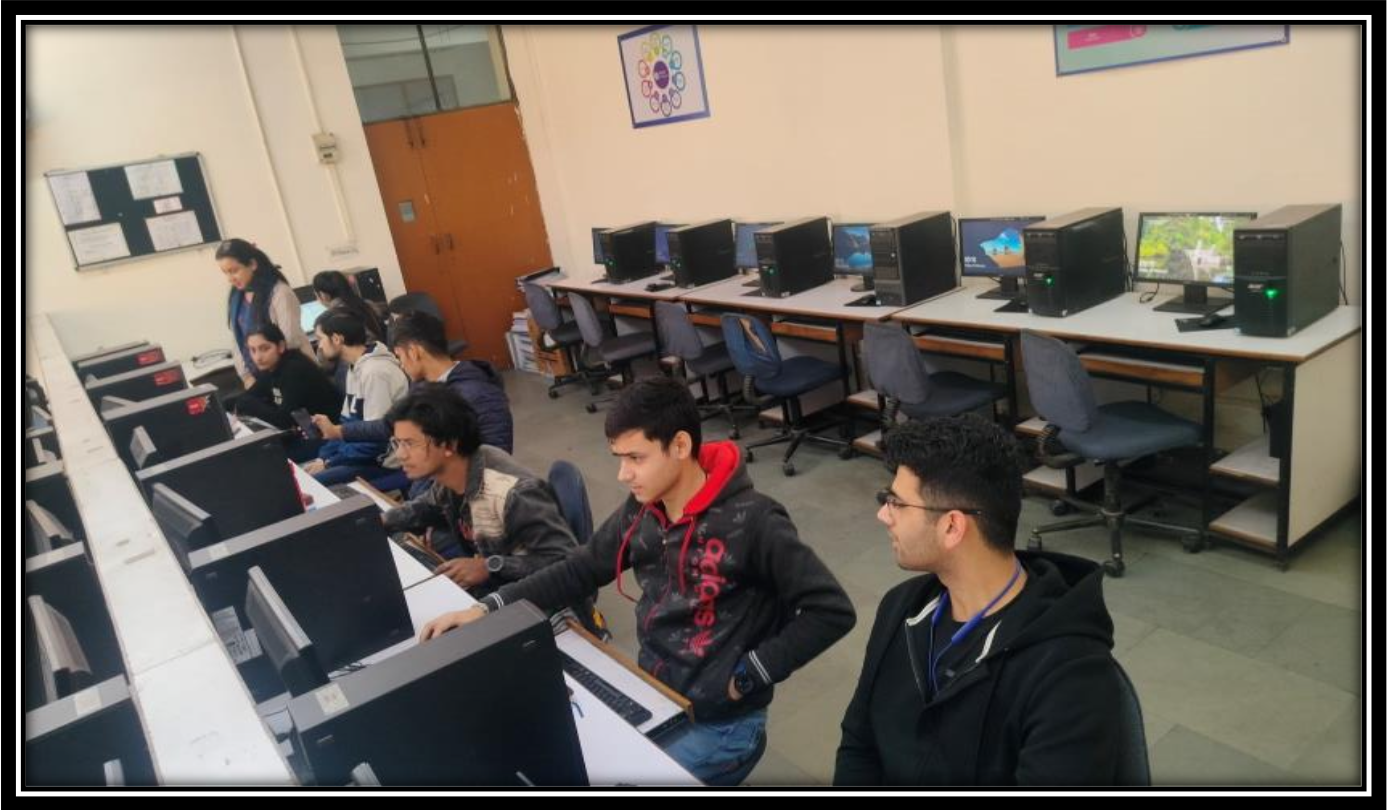
DS/PSLP Lab (02)
Total Number of Systems: 25
System Configuration:
-
Processor: – Dell Core i7 2.11 GHz (20 pc),
Acer Core i5 3.0 GHZ (05 pc).
-
RAM – 16GB DDR 5,
4 GB.
-
Operating system: – Window 10/7 (License)
Subjects Taught:
-
Data Structure (DS) CIC-255
-
Computational Mathematics (CM) ES-251
-
Probability, Statistics and Linear Programming (PSLP) BS-252
Software Installed:
-
Turbo C++
-
Scilab Software
This lab emphasizes hands-on experience with the principles of DS, CM and PSLP. It provides students with a platform to develop programs for data structures and computational mathematics applications. Additionally, the lab serves as a valuable resource for students to explore PSLP lab exercises, which include visualizing probability distributions using Scilab Software, an open-source platform.
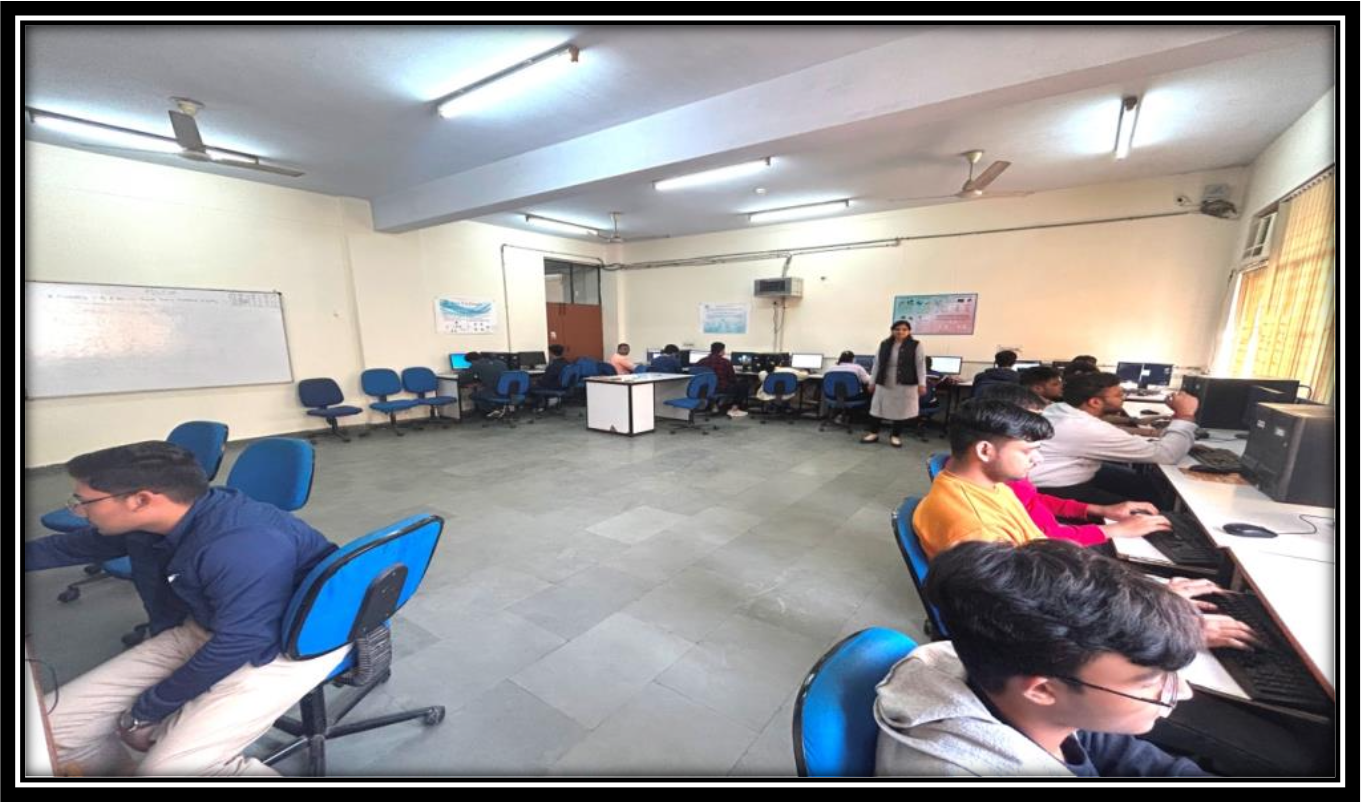
Web Technologies / Compiler Design Lab (107)
Total Number of Systems: 20
System Configuration:
-
Processor: – ACER, P-V Core i5 processor, 2nd generation,3.0 GHz, 4GB DDR3
RAM,500 GB(19) & Dell 12th generation Intel (R) Core™ i7- 12700 2.10GHz
Processor/8.00 GB RAM(01)
-
RAM – 4/8 GB
-
Operating system: – Window 10 (License)
Subjects Taught:
-
Compiler Design (CD) CIC-351
-
Web Technologies (WT) CIE-356P
Software Installed:
-
Turbo C++
-
VS Code
The lab is well-equipped, focusing on providing hands-on experience in both compiler design and Web Technologies. In WT Lab, a practical approach to designing web pages is taught for the development of web applications. In CD Lab, implementation of core concepts of compiler like removal of left recursion from grammar, implementing Shift Reduce parsing, etc. are taught.
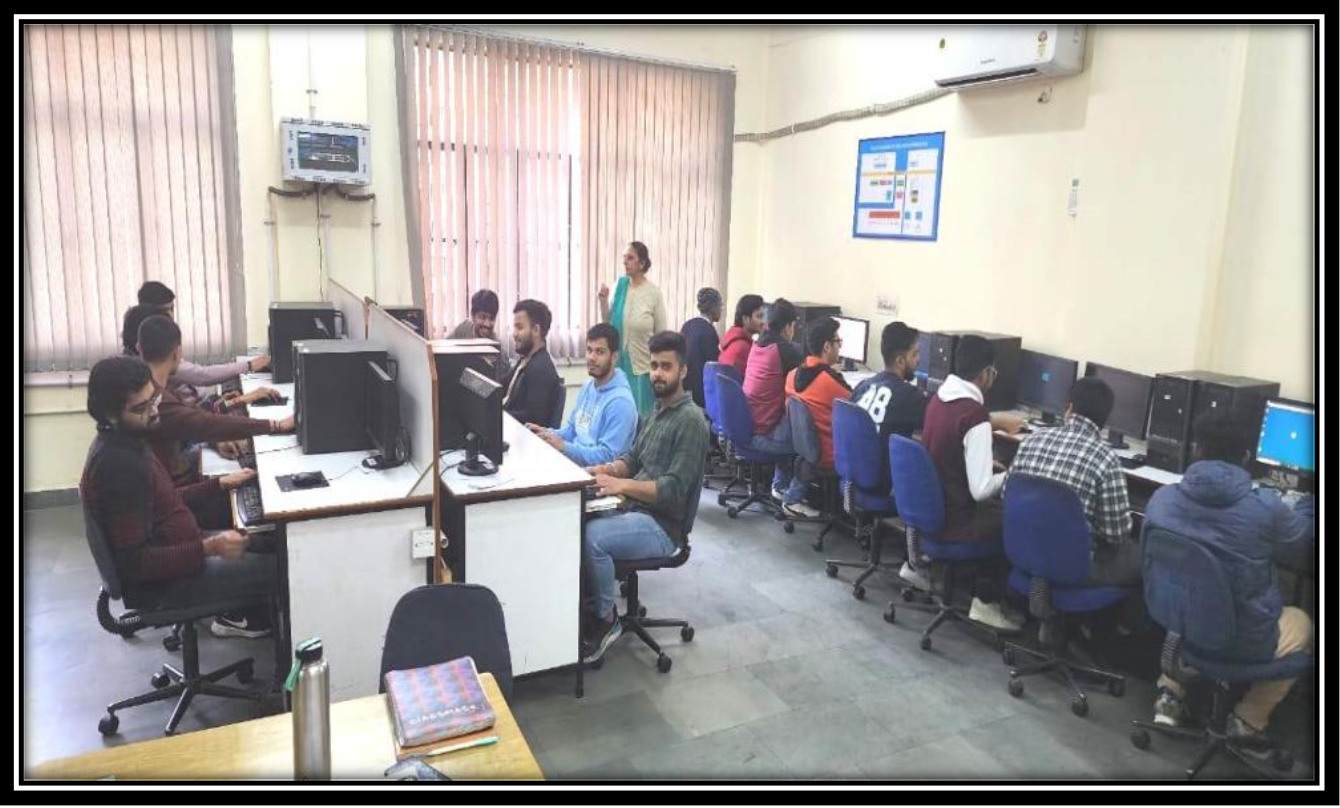
DBMS/SE Lab (108)
Total Number of Systems: 30
System Configuration:
-
Dell Precision Core i7 @14700 Processor/16 GB DDR-5 RAM
-
Dell 12th generation Intel (R) Core™ i7- 12700 2.10GHz Processor/8.00 GB RAM
Subjects Taught:
-
Database Management Systems (DBMS) CIC-256
-
Software Engineering (SE) CIC-357
Software Installed:
-
Oracle 9/11G
-
Star UML 5
It is a well-equipped lab with a focus on hands-on experience in both DBMS and SE concepts. In DBMS, Structured Query Language (SQL) is taught for accessing, modifying and updating the information in the database. In SE, a practical approach towards designing different UML diagrams is taught for the development of the project.
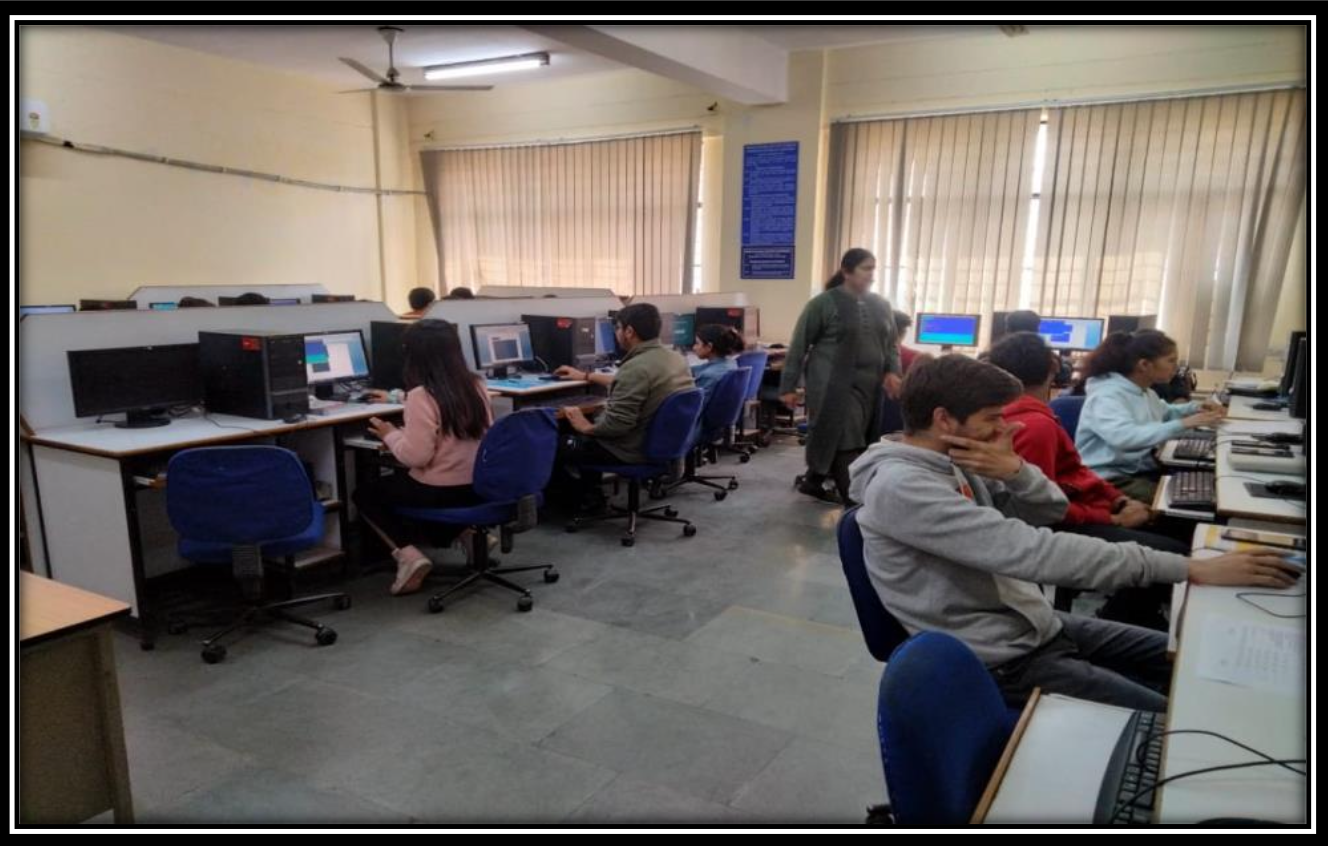
Programming Lab (110)
Total Number of Systems: 31
System Configuration:
-
Processor: – ACER, P-V Core i5 processor, 2nd generation,3.0 GHz, 4GB DDR3
RAM,500 GB.
-
Dell 12th generation Interl (R) Core™ i7- 12700 2.10GHz Processor/8.00 GB RAM
-
Dell Precision Workstation M/N, 3460 SFF CTO, 13th Gen Core i7 @13700
Processor/16 GB DDR-5 RAM
Subjects Taught:
-
Artificial Intelligence (AI) AI-302P
-
Machine Learning (ML) ML-407P
-
Programming Subjects
Software/Hardware:
-
SWI Prolog
-
Python
-
Java
This Lab is prepared to allow students to practice and perform practicals related to AI, ML and IOT. Students are encouraged to start from basic to advanced programming. The Lab is well-equipped with all advanced softwares (Arduino IDE, Prolog, Python) for practical applications.

Networking Lab (111)
Total Number of Systems: 20
System Configuration:
-
Processor: – Intel ® Core ™ 10700 CPU @2.90 GHz, i7 10th Generation
-
RAM – 8 GB DDR4
-
Operating system: – Window 10 (License)
Subjects Taught:
-
Computer Networks (CIC-355)
-
Programming in Java (CIC-258)
-
Programming in Python (CIE-332P)
Software Installed:
-
Network Simulator-3 (NS-3)
-
Cisco Packet Tracer
-
Java (NetBeans)
-
Python
It is a well-equipped networking lab with a focus on hands-on experience in Computer Networks, Java and Python programming concepts. In networking, students get hands-on training in the design/simulation of computer networks using Cisco Packet Tracer and NS-3. They also learn about various network topologies and network protocols like sliding window, UDP, TCP and perform socket programming.
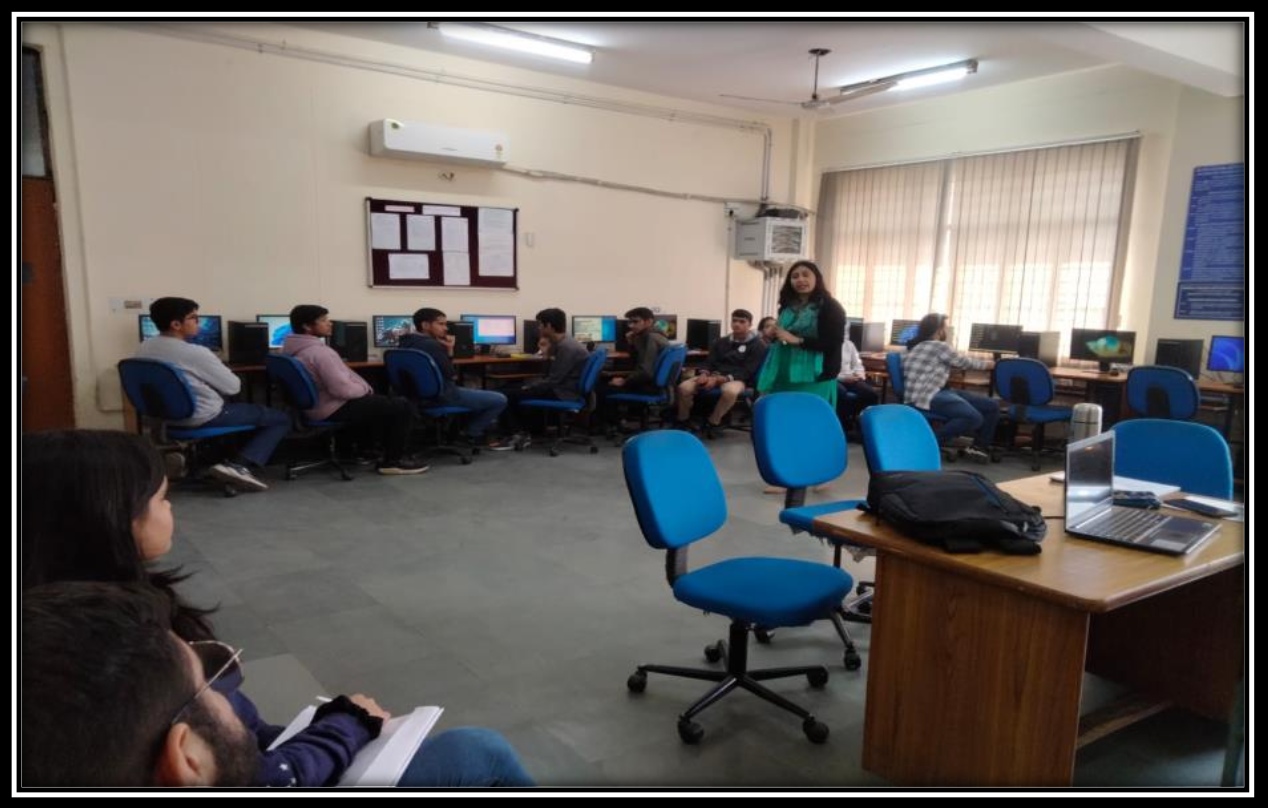
Circuit & System/Project Lab (501)
Total Number of Systems: 09
Total Number of Kits:
System Configuration:
• GPU-Dell Precision 3660 workstation, Intel Core i7-13700 Processor, Intel Q 670 Chipset Motherboard, 32 GB DDR5 RAM, 1 TB PCLe NVMe M.2 SSD, Nvidia Quadro 8 GB T1000 Graphic Card, Integrated Gigabit LAN/Dual Processor: – Intel ® Core ™ 10700 CPU @2.90 GHz, i7 10th Generation (03)
• Dell Precision-3460 Workstation, Intel 14 Gen Core I7-14700, 2.11GHz, 20 Core, 33MB Cache 16GB DDR5 RAM @5600Mhz, 512 GB Pcle NVmeSSD, Nvidia Quadro RTX T400 with 4 GB/ Integrated HD Audio,Gigabit Lan, Dual Band Internal Wireless + Bluetooth, USB Keyboard and Mouse, 19" HD Display Monitor with 3 Year NBD Warranty (03)
• Aceri5-(Core -i5 Processor 2nd generation, 3.00 GHZ, 4 GB DDR3 RAM, 500 GB HDD, DVD/RW Keyboard, Optical Mouse , TFT Screen-18.5”, APC UPS RAM – 8 GB DDR4 (03)
Hardware Devices
• Electrical Circuit Trainer Kit, Digital Multi meter, Frequency generator, Kit To parallel RLC circuit, Kit TO series RLC circuit, DC Regulated Power Supply
Subjects Taught:
• Circuit & System Lab –EEC-254
• Minor Project/ Major Project -ES-452/ES-454
This Circuit & System Lab aims at introducing the IT students to the hands on experience on calculating and analysing the parameters of two port networks such as Z,Y, ABCD and others. The equipments are electronic circuit trainer kits and RLC circuits kit to facilitate students to study the phenomenon of resonance and transients in ac system. Project laboratory has been set up in the Department of Information Technology to promote innovation/research and development activities in the core and interdisciplinary domains. The lab is utilized by the students for their project work, and preparing for competitions such as E-yantra robotic project competition, Hackathon, Ideathon, Confluence etc.
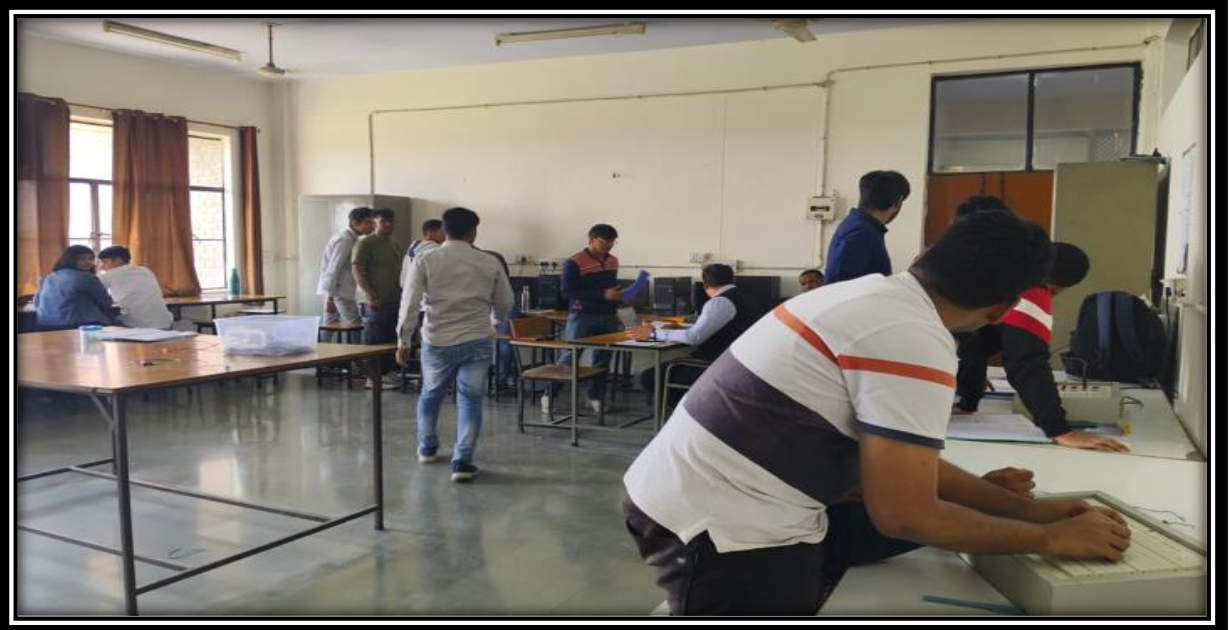
Centre of Excellence (CoE) Lab (504)
Total Number of Systems: 5+5= (10)
System Configuration:
• Processor: – Desktop Z2 Intel(R) Core(TM) i7-147002.10 GHZ
• Server Processor:-HPE ProLaint ML30 GEN10 Intel XEON 2314
• HP Laptop Intel Core I7-1255U
• Dell Laptop Intel Core I7-1355U
• RAM – 16 GB
• Operating system: – Window 11/10 (License)
Subjects Taught:
• Introduction to Internet of Things (CIE-330P)
Hardware Components:
Arduino Uno, Arduino Nano, Esp32, Raspberry Pi 4 Model-B with 4 GB RAM, Raspberry Pi 5 8 GB, STM32 Nucleo, BreadBoard, Temperature Sensor, DHT11, DHT22, Relay, Ultrasonic Sensor, IR Sensor, LED, Resistors, HC-05, Push Button, Servo Motor etc.
Software Installed:
• Arduino IDE
• Python
This lab focuses on research and development work in Introduction to Internet of Things (IOT), Artificial Intelligence (AI) and Machine Learning (ML). In even semester, IOT is an optional subject for third year IT students and lab is used for conducting IOT lab experiments as per GGSIPU curriculum. However, lab is open to all the students in odd and even semester to carry out their research and project work.
Industry Academia Interactions
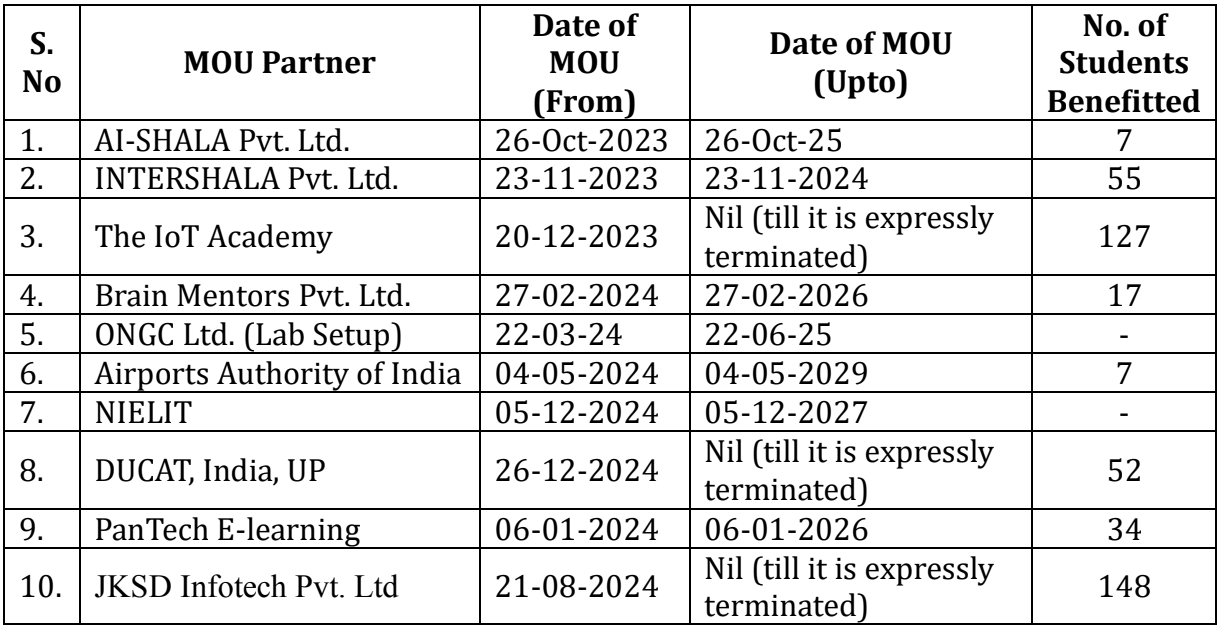
• All the aforementioned MOUs primarily focus on skill development, research,
Guest lectures, Summer training, and Industrial visits.
• The MOU with ONGC Ltd facilitated financial assistance for establishing a
Center of Excellence (CoE) laboratory focused on the Internet of Things (IoT),
Artificial Intelligence (AI), and Machine Learning (ML).
Department of Electronics and Communication Engineering
LAB# 204: Probability, Statistics and Linear Programming Lab/ Statistics, Statistical Modelling & Data Analytics Lab / Machine Learning and Data Analytics Frameworks Lab/ Microelectronics Lab
Total Number of Systems: 20 (07 Dell + 13 Acer)
Systems Configuration:- 07 DELL
- Processor- Intel core i 7 CPU , 512GB HDD
- RAM - 16 GB
- Operating System – Window 10 (Licensed)
Systems Configuration:- 13 ACER
- Processor- Intel Core i5 CPU, 500 GB HDD
- RAM - 4GB
- Operating System – Window 10 (Licensed)
Subjects Taught:
- Probability ,Statistics and Linear Programming Lab (BS-252)
- Statistics, Statistical Modelling & Data Analytics Lab (DA-304P)
- Machine Learning and Data Analytics Frameworks Lab (ML-469P)
- Microelectronics Lab (ECC-353)
Software Installed:-
- Scilab
- R Studio
- Tanner Tools
In the Data Analytics Lab , R is used for Statistical, Inference Data, Analysis , Machine learning algorithm .
In the PSLP Lab, Scilab is used To understand probability and probability distributions. Summarization of data, use test of hypothesis, solving linear programming problems.
In the Microelectronics Lab, Tanner Tool is used to design & simulation of VLSI circuits.
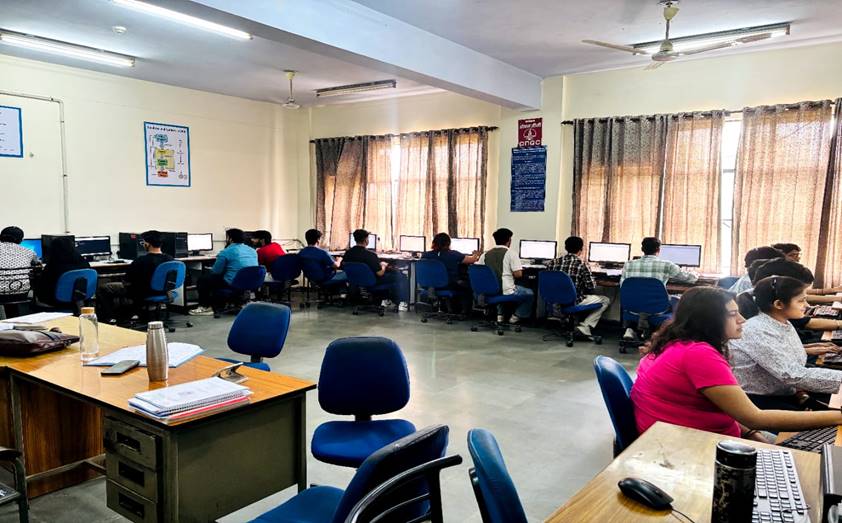
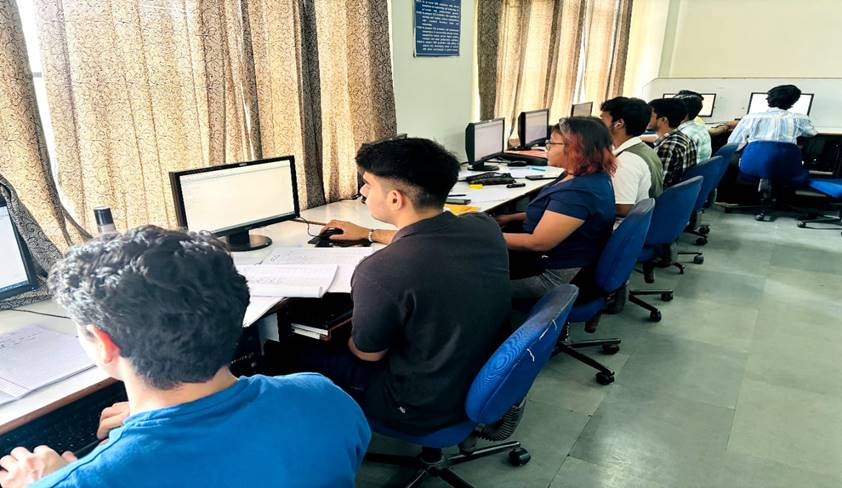
LAB# 202 : Probability Statistics and Linear Programming Lab/ Data Analytics Lab/Digital Signal Processing Lab / Signal & System Lab
Total Number Of System : 22 (06 Dell + 13 Acer + 02 Wipro + 01 Assembled)
System Configuration :- 06 DELL
- Processor- Intel core i7 CPU , 512 GB HDD
- RAM - 16 GB
- Operating System – Window 10 (Licensed)
System Configuration :- 13 ACER
- Processor- Intel Core i5 CPU ,500 GB HDD
- RAM - 4GB
- Operating System – Window 10 (Licensed)
System Configuration :- 02 WIPRO
- Intel ( R) Duo CPU 2.93 GHZ
- RAM – 2GB
System Configuration :- 01 Assembled
- Matlab Server
Subjects Taught:
- Probability ,Statistics and Linear Programming Lab
- Data Analytics Lab
- Digital Signal Processing Lab
- Signal & System Lab
Software Installed :-
- Scilab
- R Studio
- Matlab 7.0 (Licensed)
In the Data Analytics Lab , R is used for Statistical, Inference Data, Analysis , Machine learning algorithm .
In the PSLP Lab , To understand probability and probability distributions. Summarization of data, use test of hypothesis, solving linear programming problems.
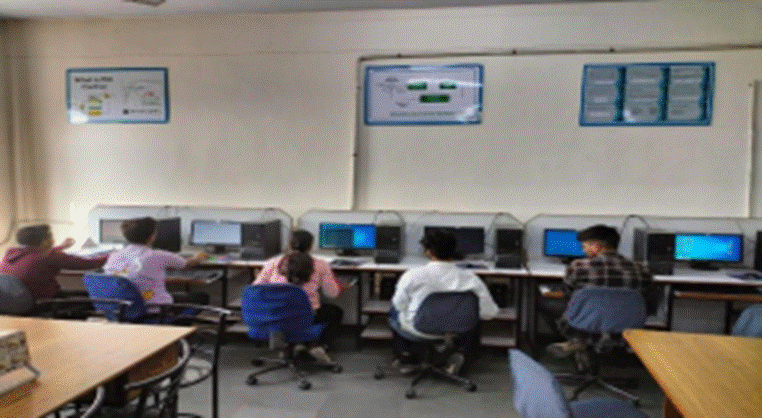
Lab#210: Analog Communication Lab / Digital Communication Lab / Control Systems Lab / Pattern Recognition Lab
Total No. of Dell Systems: 05
System Configuration:
- Processors: 12th Gen Intel( R)Core(TM ) I7-12700 ,2.10GHz
- RAM :8.00GB (7.70 GB usable)
- Operating System : Windows 11, 64-bit operating system
Total No. of Acer Systems: 05
- Processors: Intel( R)Core(TM ) i-53330S CPU @2.70GHz
- RAM : 4.00GB93.33 GB )
- Operating System : Windows 7, 32-bit operating system
Subjects Taught :
- Analog Communication Lab(ECC-255)
- Digital Communication Lab(ECC-258)
- Control Systems Lab(ECC-355)
- Pattern Recognition Lab(ECE-405 P)
Software Used:
MATLAB
List of Equipments:
- DSO (Digital storage oscilloscope) 100 MHZ,2Gs /s,40MHZ.500GS/s
- Mixed Domain oscilloscope 100MHZ, 2.5GS/s
- AM kits
- FM kits
- Data formatting kits
- Function Generators
- Data Generators
Lab #213: Analog Electronics I & II Lab / Electronics I & II Lab /opoc Lab
Total Number of Hardware :10
Hardware Configuration:
|
S. No |
Name of Equipment |
Make |
Quantity |
|
1 |
DSO 100MHz |
Silicon Elec. Dual Ch. |
10 |
|
2 |
Analog Trainer Kit(AL-303) |
Vinytics |
10 |
|
3 |
Function Generator (4061) 10MHz |
Silicon Elec. Dual Ch. |
10 |
|
4 |
Power supply RPS-2301M |
Vinytics |
2 |
|
5 |
Multimeter (SM7023) |
Scientific |
10 |
|
6 |
HP LaserJet Printer 1020 |
HP |
01 |
|
7 |
Computer P-IV |
HP |
01 |
|
8 |
Bread board |
Crown Electronics |
02 |
|
9 |
Bread board |
Silicon Elec |
10 |
|
10 |
Computer i7 * |
Dell |
10 Issued 9 system in 218,214 |
SubjectsTaught:
- Analog Electronics I & II Lab
- Electronics I & II Lab
SoftwareInstalled:
- Proteus 7.7
In the Analog Electronics I & II Lab / Electronics I & II Lab, the students use mainly hardware to perform experiments prescribed by university.
OPOC Lab :-
Advance fiber optics trainer kit 07
Power Meter 02
D.S.O. (dual channel 40 Mhz ) 04
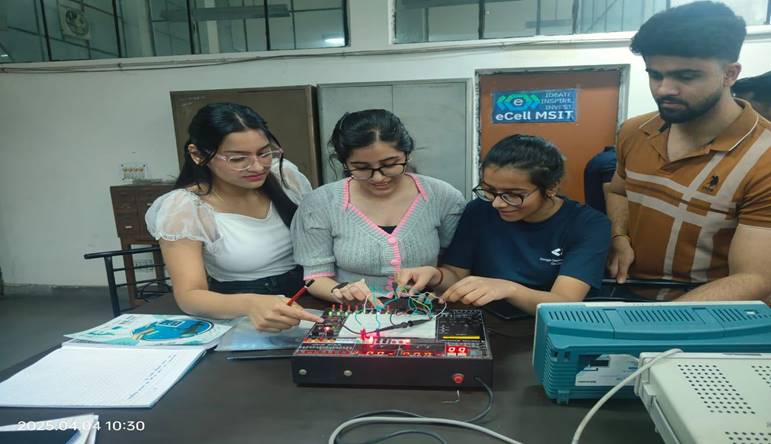
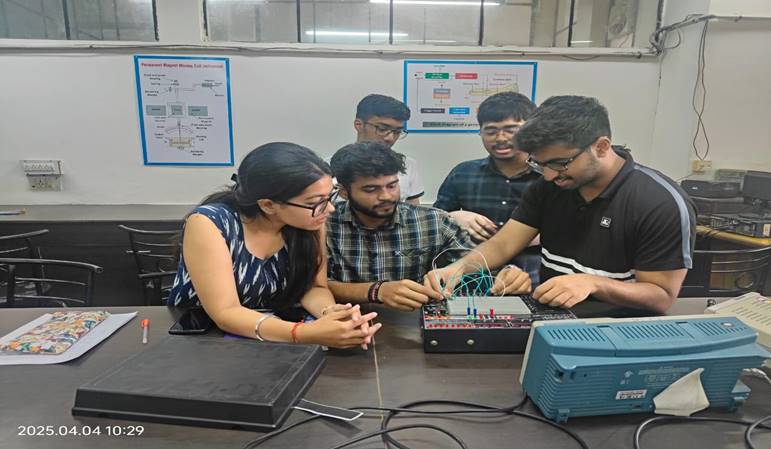
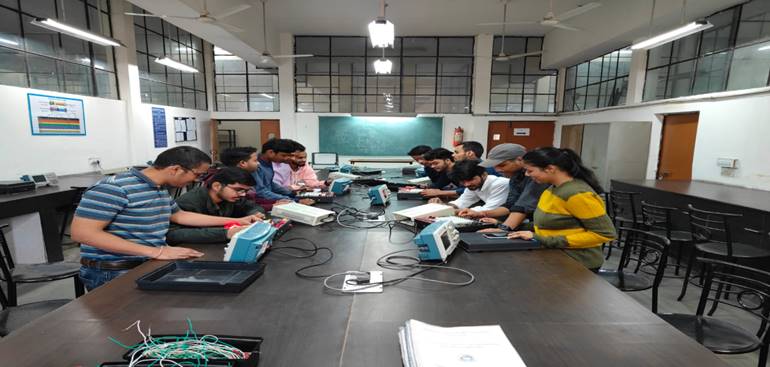
Lab #214: Machine Learning Lab / Microprocessor & Microcontroller Lab /
DLCD Lab / Unsupervised Learning Lab / NIBOT Lab
Total Number of Systems: 15
System Configuration & Lab equipments:
∙ Processor: – 13th Gen Intel(R) Core(TM) i7-12700 2.10 GHz 16 GB RAM, 500 GB HDD∙ Operating system: – Window 10 (License) 64 bits - Total 13 System
∙ Processor: – Intel Core I5 3.0 GHz 4 GB RAM, 1 TB HDD∙ Operating system: – Window 10 (License) 64 bits - Total 01 System
∙ Processor: – Intel Core 2.93 GHz 4 GB RAM, 500 GB HDD∙ Operating system: – Window 10 (License) 64 bits - Total 01 System
∙ HP Printer – Total 1
∙ Digital Trainer Kits – Total : 20 (DLCD Lab)
∙ Microprocessor Kits – Total : 32 (8085 Kits-15, 8086 Kits-17) (MPMC Lab)
∙ Interface Cards
Subjects Taught:
∙ Machine Learning.
∙ Microprocessor & Microcontroller.
∙ Digital Logic & Computer Design
∙ Unsupervised Learning
∙ Nature Inspired Biological Optimization Techniques Lab
Software Installed:
∙ Python Language (Version 3.8)
∙ Jupiter 3.1 Notebook, Anaconda 3
∙ 8085 Simulator (Jubin mitra)
∙ EMU8086 (Microprocessor Emulator V 4.08)
∙ MCU 8051 IDE v1.4.9 (An open source IDE for mcs-51 based microcontrollers for POSIX Systems.
In the ML Lab, the students use Python due to extensive library ecosystem, robust visualization capabilities, low barrier to entry, strong community support, flexibility, readability, and platform independence make it an ideal choice for machine learning purposes. The objective of this Lab is to make use of Data sets in implementing the machine learning algorithms, Implement the machine learning concepts and algorithms in any suitable language of choice
In DLCD lab, students will be able to design and analyze the combinational and sequential circuits and execute the assembly language program for 8085 and 8086 Microprocessor.
In NIBOT Lab we introduces students to foundational concepts and practical implementations in machine learning and artificial intelligence. The experiments start with basic linear and multiple regression models, followed by exploring relationships between variables through correlation plots. Students then progress to building and training perceptrons and artificial neural networks with and without backpropagation. The lab also covers optimization problems like the Travelling Salesperson Problem using genetic algorithms, and fundamental learning rules such as Hebb’s Rule. Additionally, students will implement clustering (crisp partitions) on real-life datasets like Iris and simulate basic logic gates. These exercises provide hands-on experience with core AI techniques and prepare students for more advanced projects.
A microprocessor and microcontroller lab provides hands-on experience with these fundamental computing components, supplementing theoretical knowledge with practical application. The lab aims to develop programming skills, demonstrate interfacing techniques, and explore diverse applications of microprocessors and microcontrollers in embedded systems. Students learn to program in assembly language, interface with I/O devices, and design circuits for various applications.
Lab#218: Artificial Intelligence Lab / Antenna Design & Radiating Systems Lab/Transmission line and Waveguide Analysis Lab/Supervised and deep learning lab
Total No. of systems: 22
System Configuration: 10 DEL
- Processor:-12th Gen intel ® Core™ i7-12700 2.10 GHz
- RAM :8GB
- Operating System: Windows 10; 64 bit operating system, x64 based processor
System configuration :10 DEL
- Processor:-13th Gen intel ® Core™ i7-13700 2.10 GHz
- RAM :16GB
- Operating System: Windows 10; 64 bit operating system, x64 based processor
Total No. of HP systems: 02
System Configuration:
- Processor:- Intel® Core™2 Duo CPU E7500 @ 2.93GHz
- RAM :4GB (3.44 GB usable)
- Operating System: Windows 7; 32 bit operating system
Subjects Taught:
- Artificial Intelligence (ECE 318P)
- Antenna Design & Radiating Systems Lab (ECE 330P)
- Transmission line and Waveguide Analysis Lab (ECC-357
- Supervised and deep learning lab (ML-463P)
Software used:
- SWI Prolog / CST Studio Suite
In the AI Lab, the students use SWI Prolog Programming software to perform experiments based on artificial intelligence. Students are encouraged to start from basic to advanced programming.
In the AD&RS Lab, the students use CST Studio Suite software to perform experiments based on AD&RS. Students are encouraged to start from basic to advanced antenna designing and simulation.
In the TWA Lab, the students use CST Studio Suite software to perform experiments based on TWA. Students are encouraged to make project using the software.
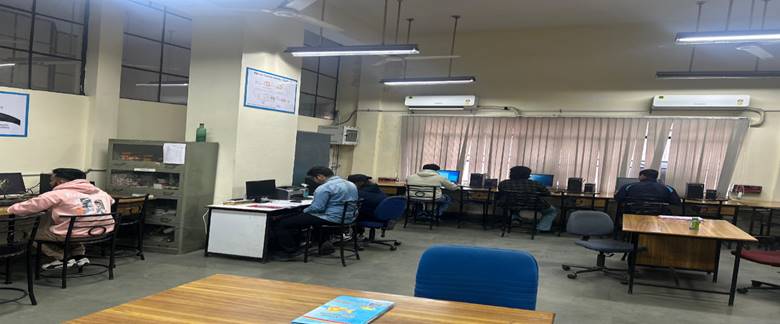
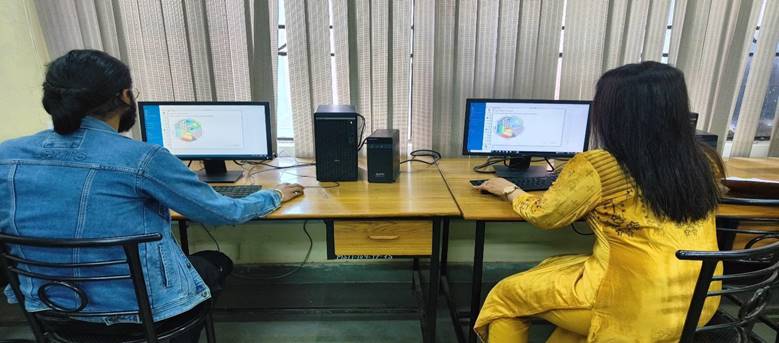
LAB# 216: Project Lab
The department offers an exclusive project laboratory, fully equipped with state-of-the-art hardware and software resources. These facilities are designed to support students in completing their project work. Additionally, students are encouraged to utilize other laboratories for their project-related tasks when necessary.
Total Number of System: 09 (05 Dell +3 Acer+1 HP)
System Configuration: - 04 DELL
Processor- Intel core i7 CPU , 512 GB HDD, RAM - 16 GB, Operating System – Window 10 (Licensed)
System Configuration: - 01 DELL
INTEL CORE I5-7400CPU @3GHZ
System Configuration: - 03 ACER
Core i5, 2nd Gen, 4GB DDR3 RAM, 500GB HDD
System Configuration: - 01 HP
DUO,[email protected] RAM 4GB
Software Installed:-
- Scilab
- R Studio
- Matlab
- Python/Jupiter
- Python Language (Version 3.8)
- Jupiter 3.1 Notebook, Anaconda 3
- 8085 Simulator (Jubin mitra)
- EMU8086 (Microprocessor Emulator V 4.08)
- MCU 8051 IDE v1.4.9 (An open source IDE for mcs-51 based microcontrollers for POSIX Systems.
Hardware Equipment’s /Components available:
|
Power Supplies |
4 |
|
DSO |
4 |
|
Screw Driver 911 |
2 |
|
Disordering Pump |
5 |
|
Stripper Wire & Cutter |
4 |
|
Self Adjusting cutter /wire stripper |
1 |
|
Screw driver 6 inch |
2 |
|
Long Nose Pliers (PYE) |
2 |
|
Iron Stand |
5 |
|
Screw Driver 824 |
4 |
|
Screw Driver 825 |
5 |
|
Digital Multimeter DT 9205A |
6 |
|
Transformer 606 Delton |
10 |
|
File Flat 6” |
8 |
|
Battery 9 volt |
3 |
|
Tweezers |
9 |
|
Screw Driver 932 |
2 |
|
|
|
|
|
|
|
|
|
Department of Electrical and Electronics Engineering
MAHARAJA SURAJMAL INSTITUTE OF TECHNOLOGY C-4, Janak Puri, New Delhi
ELECTRICAL & ELECTRONICS ENGINEERING DEPARTMENT
I. Lab #506A: Utilization of Electrical Energy lab / Electrical Machines-I
1. Subjects Taught:
• Utilization of Electrical Energy Lab. , Subject code – EEE-320P,
Class/Branch : EEE/6th semester
• Electrical Machines-I Lab. , Subject code – EEC 257,
Class/Branch: III Sem. /EEE branch
2. About the Lab: -
In this UEE Lab the students work on experimental kits for comparison and measurement of various photometric indices of Illumination. Experiments are based on concepts of energy utilization and calculation.
In the Electrical Machines-I Lab the student’s studied the cut section for different parts of DC machine, Motors and Transformers. Students perform the experiments on Experimental set up to perform internal and external characteristics of DC Generator, Load test, Speed control and efficiency calculation on DC Motors and Efficiency and voltage regulations of Transformer.
II. Lab #506B: Electrical Machines-II
1. Subjects Taught:
∙ Electrical Machines-II Lab. , Subject code – EEC 256,
Class/Branch: IV Sem. /EEE branch
2. About the Lab: -
In the Electrical Machines-II Lab Students use Alternators, AC motors and to perform experiments based on Alternators and A.C. Motors. Students perform the experiments on Experimental set up to perform no load and block rotor test on 3 phase induction motor and Single phase IM. Load test on three phase Squirrel cage Induction Motor (IM) and Slip ring IM. V curves using Synchronous motor and synchronization of Alternators etc. Cut section to study different parts of AC. Machines.
III. Lab #502: Power Systems I lab / Power Systems II lab/ Networks analysis and synthesis lab
1. Subjects Taught:
• Power System –I Lab. , Subject code – EEC - 260,
Class/Branch : IVth semester/ EEE
• Power System –II Lab. , Subject code – EEC-351,
Class/Branch : Vth semester/ EEE
• Network Analysis and Synthesis, Subject code – EEC-206,
Class/Branch : IVth semester/ EEE
2. About the Lab: -
This Power System –I Lab and Power System –II Lab aims at introducing the EEE students to the hands on experience on analyzing the behaviour of basic power systems components such as transmission lines/CT-PT/Cables/Earthing in modern Power Systems. Protective Relays (IDMT/Buchholz/Thermal/Differential) and their working during faults facilitate students to study the behavior of a power system under different fault conditions.
This Network Analysis and Synthesis Lab aims at introducing the EEE students to the hands on experience on calculating and analyzing the parameters of two port networks such as Z,Y, ABCD and others. The equipments are electronic circuit trainer kits and RLC circuits kit to facilitate students to study the phenomenon of resonance and transients in ac system.
IV. Lab #227: Electrical Science Lab
1. Subjects Taught:
• Electrical Science Lab. , Subject code – ES-159,
Class/Branch : I and II semester/ EEE, ECE, CSE, IT
2. About the Lab: -
In the ES Lab each experimental bench is equipped with variable AC and DC power supplies with adequate protections, which enable students to carry out the experiments in an electrically safe environment. The Lab is equipped with energy meter, power meter, voltmeters, ammeters, wattmeter, various size of transformers, motors.
V. Lab #306B: Statistical Modelling & Data Analytics Lab/ Probability, Statistics and Linear Programming Lab/ Computational Methods Lab / Machine Learning Lab / PPI Lab
Total Number of Systems: 14
System Configuration:
• Processor: – P-V Core i5
• RAM – 4 GB
• Operating system: – Window 10 (License)
• HP Core 2 duo
Subjects Taught:
• Computational Methods (CM) ES-251 (III Sem)
• Probability, Statistics and Linear Programming (PSLP) BS-252 (IV semester) • Statistical Modelling & Data Analytics (SMDA) DA-304P (VI semester) • Machine Learning (ML) ML-342P (VI semester)
• Power Plant Instrumentation (PPI) (VIII semester , EEE)
Software Installed:
• Matlab, R Programming
• Anaconda
• Turbo C
This lab emphasizes hands-on experience with the principles of CM and PSLP. It provides students with a platform to develop programs for computational mathematics applications. Additionally, the lab serves as a valuable resource for students to explore PSLP lab exercises, which include visualizing probability distributions using MATLAB (Matrix Laboratory), Software.
In SSMDA Lab, the students use MATLAB (Matrix Laboratory), R programming software to perform experiments based on data analysis. In Machine learning Lab, the students use Anaconda software for data mining and data processing.
This Lab is also prepared to allow students to practice and perform practical related to ML. Students learn Python programming concepts. Students are encouraged to start from basic to advanced programming. The Lab is well equipped with all advanced software for practical applications.
VI. Lab #306 A: Electric Drives / Power Electronics Lab
1. Subjects Taught:
• Electric Drives Lab. , Subject code – EEE-340P,
Class/Branch : VI semester/ EEE
• Power Electronics Lab. , Subject code – EEC 357,
Class/Branch: V Sem. /EEE branch
2. About the Lab: -
In Electric Drives Lab Students perform and analyze different speed control methods for AC/DC motors using AC drives and DC drives. Closed control speed control is also performed practically and using software. The different parameter variations are observed using DSO.
In power Electronics Lab Students perform and analyze characteristics of various power semi conductor devices. Different waveforms are developed and studied for various converters at different loads by using DSO. Power electronics circuit in real time applications are constructed in lab.
3. System Configuration:
Different experimental setups for performing speed control of motors. Systems for performing speed control using MATLAB.
VII. Lab #: EEMI LAB / Workshop
1. Subjects Taught:
• EEMI Lab. , Subject code – EEC-353,
Class/Branch : V semester/ EEE
• Workshop Lab, Subject code – EEC-259
Class/Branch : III semester/ EEE
2. About the Lab: -
EEMI lab aims to introduce the EEE students to hands-on experience in analyzing the behavior of basic instruments for power and energy measurement, calibrating instruments, to develop the knowledge of the working application of potentiometers and bridges. Describe working principle selection criteria and application of various transducers in the measurement system.
In Workshop lab, students are able to design house wiring. They will study and design wiring of tube light, fan etc. Demonstration of different types of illumination devices like lamp, CFL, relays etc. has been done.
Department of Applied Sciences
Central Library
Maharaja Surajmal Central Library supports the teaching & research programmes of three Institutes namely, Maharaja Surajmal Institute & Maharaja Surajmal Institute of Technology. All students, faculty members and employees of the Institute are entitled to make use of the Library facilities. The Library has a well-stocked fully computerized library with latest editions of books by eminent authors & is having a huge collection of books on education, management, computer science, engineering, pharmacy, science and humanities to cater to the needs and requirements of the faculty as well as students.
Library has also a Research Wing for scholars where scholars are getting special reference material and rare collections of manuscripts for their research work on community.
BOOK BANK
Students can avail Book Bank facility which was initiated during 2006-2007. All the students joining the institute are being given a set of text books every year. This has come as a boon to the students who do not have to buy costly books for their academic preparations.
For more details, please visit:
https://sites.google.com/site/centrallibrarymaharajasurajmal/
HOSTEL AND CANTEEN
Hostel: The Maharaja Mahendra Pratap Hostel provides accommodation to around 200 boys and 100 girls in a spacious and elegant four-storeyed building with all connected facilities. Hygienic and nutritious food is provided at a reasonable cost.
Staff Accomodation: Quarters are provided to the teaching and non teaching staff with all latest facilities on reasonable charges. All the quarters are well furnished.
Canteen: The canteen of MSIT is well organized having a seating capacity of 60-70 persons simultaneously with clean surroundings. The eatables of good quality are available at reasonable cost.
SPORTS
Institute has well maintained play ground for various games such as football,volleyball, cricket, badminton etc. Facilities for indoor games such as carrom, table tennis, chess and chinese checkers are also available. These extra curricular activities help in building up personality and confidence in the students. Bank: The institute has on campus banking facility .
Medical
Psychologist
C-2B Janakpuri
Ph. - 01125552023
